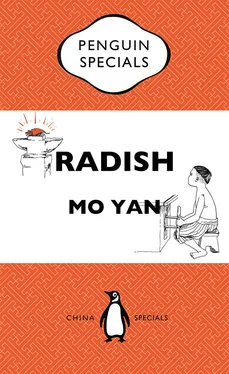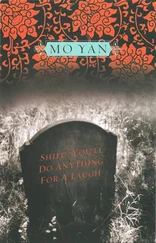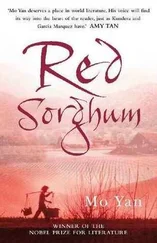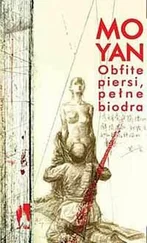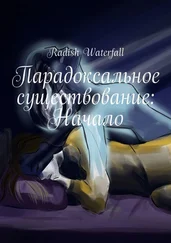At noon, Liu Taiyang rode out from Hei-hai and the mason’s village on a black bicycle. Standing in front of the floodgate, he blew his whistle to stop work and announced that the field kitchen was up, but only available to those who lived farther than five li . Everyone hurriedly gathered up their tools. The young woman stood up. So did the boy.
‘How far away do you live, Hei-hai?’
Hei-hai ignored her, turning his head this way and that, as if searching for something. Juzi’s head followed, and when his stopped swivelling, so did hers. Looking straight ahead, her eyes met the lively eyes of the mason, and they held the look for nearly a minute.
‘Time to eat, Hei-hai,’ the mason said. ‘Let’s go home. Don’t give me that look, it won’t do you any good. We live a couple of li from here, and we’re not lucky enough to eat in the kitchen.’
‘You two are from the same village?’ she asked the mason.
Stuttering with excitement, he pointed toward his village, telling her that he and Hei-hai lived just across the bridge. They chatted cordially, about ordinary things. He knew she lived in the village up ahead, so she could eat in the kitchen and sleep under the bridge. She was willing to eat in the kitchen, but not to sleep under the bridge. The autumn winds were too cold. She lowered her voice and asked if Hei-hai was a mute. Absolutely not, he assured her, adding that he was very intelligent, and at the age of four or five had been a real chatterbox, his crisp voice, like a bean in a bamboo tube, hardly ever stopped. But over time he spoke less and less, and often froze like a statue; no one had any idea what he was thinking. Look at his eyes, so black you can’t see the bottom. The woman remarked that he did seem smart, and for some reason she’d taken a liking to him, almost like a kid brother. The mason said that’s because you’re a good person with a kind heart.
The three of them — mason, woman, Hei-hai — lagged behind, the man and woman talking fervently, as if hoping to drag out the walk. Hei-hai followed, lifting his legs high and stepping lightly, his expression and movements like those of a small tomcat patrolling the base of a wall. Liu Taiyang, who had been delayed in the grove of river locusts, caught up with them on his creaky bicycle when they reached the bridge, which was so narrow he had to get off and walk.
‘What are you hanging around here for? How’d you do this morning, you dark little monkey? Hey, what happened to your paw?’
‘Smashed his finger with the hammer.’
‘Shit! Mason, go see your team leader and have him send somebody else. I won’t be responsible if the kid kills himself.’
‘It’s a work injury,’ the woman complained. ‘You can’t do that.’
‘You and I have known each other for years, Director Liu,’ the mason said. ‘What’s one kid for a big project like this? And what can he do in the production team with that hand?’
‘Damn you, you skinny little monkey.’ Director Liu mulled it over. ‘I’ll give you a new job. You can pump a bellows for the blacksmiths, how’s that? Think you can handle it?’
The boy sent pleading looks to the mason and the woman.
‘You can do that, can’t you, Hei-hai?’ he asked.
She pitched in with an encouraging nod.
By the fifth day of pumping bellows, Hei-hai’s skin had taken on the sheen and colour of fine coal. The only parts of his body that remained white were his teeth and eyes, which made his eyes more expressive than ever. When he looked at you, with his lips clamped shut, you felt as if your heart had been seared. Coal ash filled the creases next to his nose, and his hair, which had grown half an inch, was layered with the black stuff. By this time, everyone at the worksite was calling him Hei-hai — Dark Boy — and he ignored them all, and he ignored them all, wouldn’t even look them in the eye. Only when Juzi or the mason spoke to him would he respond with his eyes. Everyone had stopped for lunch the day before, when a blacksmith’s ball-peen hammer and a new bucket for quenching steel were stolen. Liu Taiyang stepped up onto the floodgate and railed at the people for half an hour, after which he gave Hei-hai a new job: each day at noon, when the others were eating, he was to remain at the worksite and keep watch over the tools. The blacksmith would bring him food. Director Liu said the little mutt was getting a free lunch out of it.
The crowd broke up, and the worksite that had been buzzing all morning fell eerily silent. Hei-hai walked out from under the bridge and slowly paced the sandy ground in front of the floodgate, arms behind his back, one hand on each buttock, his brows knitted beneath three creases in his forehead. Back and forth he walked, counting the bridge openings. Bubbles formed and popped in the space between his lips. He stopped at the seventh pylon, wrapped his legs around the diamond-shaped pylon rock and began shimmying up. About halfway to the top, he slid back down, raking a big patch of skin off his belly, from which beads of blood oozed. He reached down, scooped up a handful of dirt and rubbed it on the skin. Then he backed up a couple of steps, shaded his eyes with his hand and studied the seam where the pylon met the underside of the bridge. He relaxed.
He ran to where the women were breaking rocks. The one he’d sat on was no longer there. He went unerringly to the place where Juzi had been working, recognising it by the six-sided head of her hammer. He sat on her rock, constantly in motion, changing positions, until he had a direct line of sight to the seventh pylon. Having found the position he wanted, he fixed his stare on the object in the seam.
At noon Hei-hai ran over to the floodgate and hunkered down by the westernmost bridge opening. He let his eyes roam over the forge, the tongs, the sledge, the ball-peen hammer, the bucket, the shovel, every hunk of coal, even the coal chips. When it was time for the others to return to work, he picked up the coal shovel with his right hand, opened the door to the forge and started pumping the bellows with his left hand, sending a cloud of coal smoke into his eyes, which he rubbed hard, turning the blood-streaked sockets purple. The bellows, newly packed with chicken feathers, were heavy, almost too much for one hand. He banged his injured finger, and when he looked down, he was reminded of the handkerchief it was wrapped in. It was no longer white, though the embroidered China rose was still red. Visited by a new thought, he walked out from under the bridge and looked around. At the seventh pylon, he unwrapped the handkerchief, put it between his teeth and started climbing. When he’d struggled to the top, he stuck it into the seam…
He poked and jabbed, but the fire was out. Sweat dotted his forehead. Footsteps sounded beyond the opening, and he backed away, terrified, until he was up against the cold stone wall. He watched as a stumpy-legged young man entered the opening at a crouch, apparently intended to show that the archway was low and that he was tall. Hei-hai drew back his lips. The stumpy young man looked at the now cold forge, partially opened the bellows, then let his eyes fall on Hei-hai, up against the wall. ‘You little son of a bitch,’ he cursed. ‘What do you think you’re doing? The fire’s out and the bellows are crooked. You’re just looking for a beating, little bastard!’ Hei-hai heard the sound of wind overhead. He felt a hard-edged hand swish above him, followed by a crisp smack, like a frog being thrown against a wall.
‘Go back to breaking rocks, you little prick,’ he cursed.
Hei-hai knew that this was the blacksmith, a young man with a pimply face and a nose as flat as a calf ’s, covered with sweat. Hei-hai watched as he deftly put the forge back in order. Then he watched him gather up golden wheat stalks from the corner, stuff them into the forge, light them, and, by gently pumping the bellows, produce wispy white smoke, followed by flames. The blacksmith shovelled in a thin layer of wet coal without letting the bellows stop. Another layer of coal was followed by yet another. Now the choking smoke was burnt brown and reeked of coal. He poked at the coal with his shovel, creating bright red flames. The coal was burning.
Читать дальше
